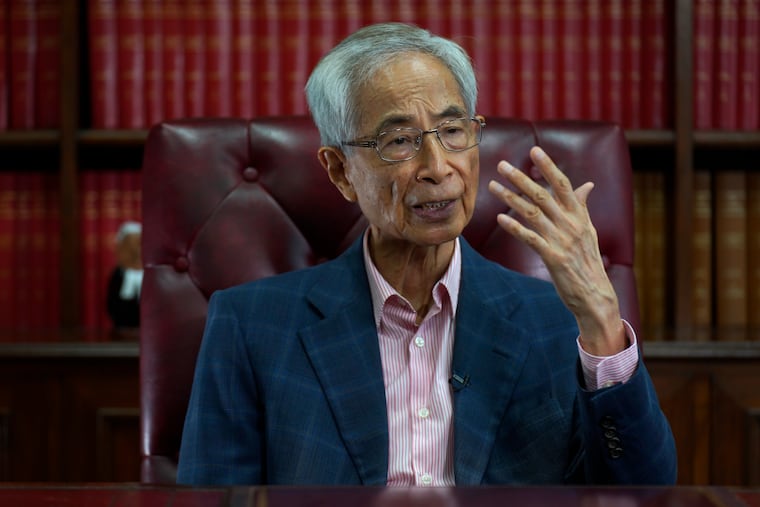Why Americans should care about the trial of democracy activist Martin Lee in Hong Kong | Trudy Rubin
China's efforts to stamp out democracy in Hong Kong and the trial of pro-democracy activists should remind Americans that rule of law is precious.

Watching the confirmation hearings for Judge Merrick Garland as attorney general reminded me of a tragic trial in process in Hong Kong.
When asked about former President Donald Trump’s claim that he had “absolute right to do what I want with the Justice Department,” Garland made clear his primary loyalty was to the Constitution, meaning rule of law.
Meantime, in Hong Kong, nine veteran pro-democracy activists are on trial on trumped-up charges, as China crushes the rule of law it pledged the city could retain for 50 years after Britain returned the territory in 1997. The Chinese government is pursuing an earlier generation who began their fight for democracy under the British.
None of their targets is more shocking than 83-year-old Martin Lee, a revered jurist, who helped write Hong Kong’s 1980 mini-constitution (the basic law) and cofounded the city’s first pro-democracy party. As Human Rights Watch China director Sophie Richardson put it to the Wall Street Journal, “When you arrest Martin Lee it’s like arresting the rule-of-law itself.”
» READ MORE: GOP conspiracy theorists are biggest threat to Biden's China policy | Trudy Rubin
I last saw Lee in November 2019, in his Hong Kong legal chambers. Few decorations disturbed shelves lined with legal volumes, but an iconic framed photo sat on one shelf, portraying Lee, fist raised, in the center of a group of pro-democracy leaders, standing on the balcony of Hong Kong’s legislature in 1997.
For decades, Lee fought to have Beijing keep a pledge for “universal suffrage” — meaning the public would more directly elect the entire 70-member legislature. Instead, the Chinese legislature empowered Hong Kong officials to unseat pro-democracy legislators. And China’s legislature passed a national security law that puts all activists in jeopardy.
At the time of my interview, Hong Kong was wracked with demonstrations over Beijing’s refusal to expand suffrage and efforts to curb judicial freedoms. Students also wanted an independent investigation into extreme police brutality.
Lee was nervous about the violence but admiring of the passion of the younger generation. “I’m so impressed by them,” he told me. “They want to learn, they know the cardinal principle of rule of law is ‘everyone must be treated equally.’ They see people arrested falsely. They know this is unfair.”
Like most older activists, Lee had not expected the extent of Xi Jinping’s democracy rollback.
He recalled a meeting he had attended between then British Prime Minister Margaret Thatcher and Chinese leader Deng Xiaoping on Dec. 9, 1984, when Deng explained the concept of 50 years of Hong Kong autonomy. “Because we need 50 years to have our economic change,” Deng told them. “At the end of 50th year, you will have even less reason to worry because by then China and the leading economies of the world will depend on each other.”
In other words, Deng promoted the idea of convergence, that as China got richer it would get politically looser, an idea U.S. leaders from both parties believed until the last few years. That optimism is gone.
“Hong Kong is the only Chinese city with rule of law, but I’m extremely worried we cannot keep it for long,” Lee told me. “The Chinese expression is ‘rule by law.’ This means the courts exist to justify and to bolster the ruling power of the Chinese Communist Party and will give whatever verdict the party wants.”
Since that interview, Beijing has increased its power over choosing Hong Kong’s leader and cracked down on local district elections, while arresting thousands of young people.
But I also recall the words of barrister Margaret Ng, 73, another venerable pro-democracy leader on trial, who served in the Hong Kong legislature for 17 years (and did her doctorate at Boston University). “If rule of law goes out in Hong Kong, this part of the world will be in darkness. Hong Kong is the only free city in China.”
“We can’t change things in [mainland] China, but we can keep our corner,” she told me in an animated discussion in Hong Kong. “The rest of the world should join in Hong Kong’s effort.”
» READ MORE: To compete with China, Biden needs bipartisan support and strong alliances | Trudy Rubin
There appears to be little the world can do to save Hong Kong and pro-democracy activists, beyond challenging China to live up to its international commitments on Hong Kong autonomy, and raising the trial issue, as House Speaker Nancy Pelosi just did. U.S. sanctions under the Hong Kong Freedom and Democracy Act appear to have had little impact. And Xi appears to believe that China’s expanding economy can survive a hit to international investment in Hong Kong.
In fact, many China experts, like lawyer Jerome Cohen, argue that the best U.S. response is to “open the doors” to those seeking to leave Hong Kong and welcome them to America.
But I suggest also paying attention to a third defendant, Jimmy Lai, 72, the brave publisher of Apple Daily. who sits in jail because a Hong Kong judge has refused to grant him bail. “Hong Kong is fighting the first battle in this [ideological] cold war,” he told me in his hillside home, “because we share the same values.”
The passion of Martin Lee, Margaret Ng, and Jimmy Lai for democratic values should remind us that such values should never be taken for granted.
After Jan. 6, we should know that, but many Americans do not.